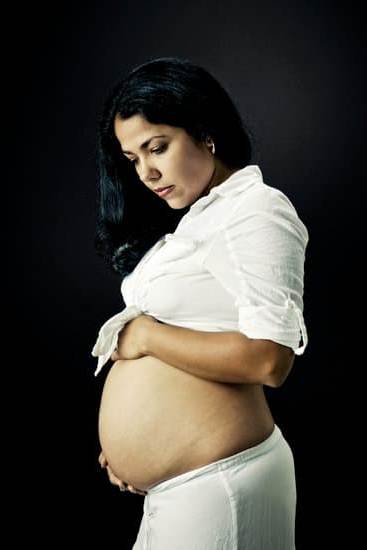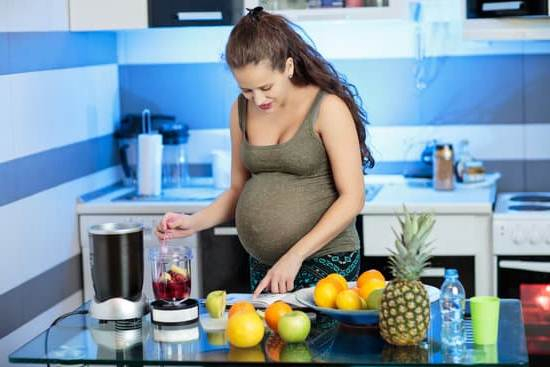Pregnancy is a crucial time for both the mother and the developing baby, and it’s no secret that nutrition plays a fundamental role in this process. The effects of nutrition during pregnancy can have a profound impact on the health and well-being of both the mother and her child.
Ensuring proper nutrient intake is vital for supporting the growth and development of the baby, as well as maintaining the overall health of the mother. In this article, we will explore the significance of nutrition during pregnancy, addressing nutrient needs, potential risks associated with poor nutrition, impacts on baby’s development, common deficiencies, the role of supplements, meal planning ideas, and long-term effects on child health.
One of the most essential aspects of maternal health during pregnancy is maintaining adequate nutrition to support not only her own well-being but also to provide sufficient nourishment for proper fetal growth. Achieving a balanced diet that meets specific nutrient requirements becomes even more critical during this period. A lack of key nutrients such as folic acid, iron, calcium, and protein can lead to adverse consequences for both mother and child.
The effects of poor nutrition during pregnancy can be far-reaching; from increasing the risk of complications during childbirth to impacting long-term outcomes for the child’s health. It is crucial to understand how nutritional choices made during pregnancy can have lasting implications for both maternal and infant well-being. In this article, we will delve into various aspects related to nutritional needs during pregnancy to highlight its importance in promoting a healthy outcome for both mother and baby.
Nutrient Needs During Pregnancy
During pregnancy, a woman’s body goes through significant changes to support the growth and development of the baby. This means that the mother’s nutrient needs also increase to ensure that both she and her baby are receiving adequate nourishment. Some key nutrients required during pregnancy include folic acid, iron, calcium, protein, and essential vitamins such as vitamin D and vitamin C.
Maternal Nutrient Needs
Pregnant women require additional folic acid to support the baby’s neural tube development, iron to prevent anemia and support the increase in blood volume, and calcium for bone development. Protein is essential for the growth of the placenta and fetus, while vitamin D helps in the absorption of calcium and supports bone health. Ensuring that these nutrients are adequately included in a pregnant woman’s diet is crucial for her overall health and the health of her baby.
Baby’s Nutrient Needs
The developing fetus also has specific nutrient needs to support its growth and development. For example, folate is crucial for DNA synthesis and cell division, which are important processes during early embryonic development. Iron is needed for red blood cell production, while calcium is essential for bone formation. Understanding the specific needs of both the mother and the baby can help expectant mothers make informed choices about their diet during pregnancy.
The Effects of Nutrition During Pregnancy
Neglecting these nutrient needs during pregnancy can have serious consequences on both the mother and the baby. Poor nutrition during pregnancy can lead to complications such as preterm birth, low birth weight, or developmental issues in children. It can also impact maternal health by increasing the risk of gestational diabetes or preeclampsia. Therefore, prioritizing proper nutrition during pregnancy is essential to reduce these risks and ensure a healthy outcome for both mother and child.
The Effects of Poor Nutrition During Pregnancy
During pregnancy, a woman’s body goes through numerous changes to support the growth and development of the baby. One of the most crucial aspects of this process is ensuring that the mother receives adequate nutrition to meet her own needs as well as those of her growing fetus. The effects of poor nutrition during pregnancy can have significant risks and consequences for both the mother and the baby, making it essential to prioritize a healthy diet during this time.
The effects of nutrition during pregnancy are far-reaching, with research indicating that inadequate intake of essential nutrients can increase the risk of various complications. Some potential risks and consequences of poor nutrition during pregnancy include:
- Low birth weight
- Preterm birth
- Increased risk of birth defects
- Prenatal mortality or stillbirth
- Maternal anemia and nutrient deficiencies
- Compromised immune function for both mother and baby
It is important to note that poor nutrition does not solely refer to undernutrition; excessive weight gain or unhealthy food choices can also have detrimental effects on pregnancy outcomes. Therefore, maintaining a well-balanced diet throughout pregnancy is crucial in minimizing these potential risks and promoting optimal health for both the mother and the developing baby.
Furthermore, research has shown that insufficient intake of specific nutrients during pregnancy can lead to long-term consequences for the child’s health. For example, inadequate intake of folic acid has been linked to an increased risk of neural tube defects in infants, while low levels of vitamin D may contribute to developmental issues.
These findings underscore the importance of addressing nutritional deficiencies during pregnancy to mitigate any potential long-term impacts on offspring health. By prioritizing adequate nutrition during gestation, expectant mothers can optimize their own well-being as well as lay a strong foundation for their child’s future health and development.
How Nutrition Affects Baby’s Development
Nutrition plays a crucial role in the development of a baby from the moment of conception to birth. The nutrients that a mother consumes during pregnancy have a direct impact on the growth and well-being of her growing baby. Proper nutrition ensures that the baby receives all the essential vitamins, minerals, and macronutrients necessary for healthy development.
One of the most critical aspects of nutrition during pregnancy is how it affects the development of the baby’s organs and systems. For example, folate, a B vitamin found in leafy greens and fortified cereals, is vital for preventing neural tube defects in the baby’s brain and spinal cord. Similarly, adequate intake of calcium and vitamin D is crucial for the development of strong bones and teeth in the fetus.
Furthermore, the effects of nutrition during pregnancy extend beyond physical development to cognitive and neurological outcomes. For instance, studies have shown that omega-3 fatty acids, found in fish and nuts, play a significant role in brain development and can even influence intelligence later in life. Therefore, it is evident that maternal nutrition has a profound impact on shaping the overall health and well-being of the unborn child.
| Nutrition During Pregnancy | Impact on Baby’s Development |
|---|---|
| Folate | Prevents neural tube defects in brain and spinal cord |
| Calcium & Vitamin D | Development of strong bones and teeth |
| Omega-3 Fatty Acids | Brain development & cognitive outcomes |
Common Nutritional Deficiencies During Pregnancy and Their Impacts
During pregnancy, a woman’s body goes through significant changes to accommodate the growth and development of her baby. This places increased demands on her nutritional intake as she needs to provide essential nutrients not only for herself but also for the developing fetus. Unfortunately, many women experience nutritional deficiencies during pregnancy, which can have serious impacts on both maternal and fetal health.
One of the most common nutritional deficiencies during pregnancy is iron deficiency. Iron is crucial for the formation of red blood cells, which are responsible for carrying oxygen to the body’s tissues and organs.
When a pregnant woman lacks adequate iron, she may develop anemia, leading to fatigue, weakness, and an increased risk of delivering a low birth weight baby or preterm birth. It is important for pregnant women to consume iron-rich foods such as lean meats, fish, poultry, legumes, and dark leafy greens, or take iron supplements as recommended by their healthcare provider.
Another significant nutritional deficiency during pregnancy is folic acid. Folic acid plays a crucial role in preventing neural tube defects in the developing fetus. A lack of folic acid can lead to serious birth defects such as spina bifida and anencephaly. To prevent these outcomes, it is recommended that pregnant women take a daily prenatal vitamin containing at least 400 micrograms of folic acid in addition to consuming folate-rich foods like leafy greens, citrus fruits, beans, and fortified grains.
In addition to iron and folic acid deficiencies, pregnant women may also experience shortages in other vital nutrients such as calcium, vitamin D, omega-3 fatty acids, and iodine. These deficiencies can potentially impact the overall health and development of the baby.
Therefore it is crucial for expectant mothers to be mindful of their dietary intake and work with healthcare professionals to address any potential deficiencies through diet modifications or supplementation. Prioritizing good nutrition during pregnancy can significantly reduce the risk of complications for both mother and child while promoting optimal health outcomes.
The Role of Nutritional Supplements During Pregnancy
Nutritional supplements can play a crucial role in ensuring that pregnant women and their babies receive the necessary nutrients for a healthy pregnancy. Here are some key points to consider when it comes to the role of nutritional supplements during pregnancy:
- Prenatal Vitamins: Taking prenatal vitamins is essential for pregnant women as they provide important nutrients such as folic acid, iron, calcium, and vitamin D. These vitamins help support the health of both the mother and the developing baby. It is important for expectant mothers to take these supplements as recommended by their healthcare provider to prevent any potential deficiencies.
- Omega-3 Fatty Acids: Omega-3 fatty acids are crucial for the development of the baby’s brain and eyes. Many prenatal supplements contain docosahexaenoic acid (DHA) and eicosapentaenoic acid (EPA), which are essential omega-3 fatty acids. Supplementing with omega-3 fatty acids during pregnancy has been linked to improved cognitive development in children.
- Iron Supplements: Iron is particularly important during pregnancy as the body requires more iron to support the increase in blood volume and to promote healthy growth of the baby. Iron deficiency during pregnancy can lead to anemia, premature birth, low birth weight, and other complications.
In addition to these essential supplements, pregnant women should also ensure they are taking adequate amounts of other nutrients like vitamin C, vitamin B6, and zinc. However, it is important for expectant mothers to consult with their healthcare provider before starting any new supplements to ensure they are safe and appropriate for their individual needs. Prioritizing proper nutrition through both a healthy diet and strategic supplement intake can have a significant impact on maternal and fetal health throughout pregnancy.
Tips for Maintaining a Healthy Diet During Pregnancy
Eating a healthy, balanced diet is essential during pregnancy to ensure the proper development of the baby and to support the mother’s overall health. Here are some tips for maintaining a healthy diet during pregnancy:
First, it is important for pregnant women to consume a variety of nutrient-dense foods from all food groups. This includes fruits, vegetables, whole grains, lean proteins, and dairy products. These foods provide essential vitamins and minerals that are crucial for the baby’s growth and development.
Secondly, pregnant women should aim to eat regular meals and snacks throughout the day to maintain stable blood sugar levels and keep energy levels up. It is recommended to eat small, frequent meals to alleviate common pregnancy symptoms such as nausea and heartburn.
Additionally, staying hydrated is key during pregnancy. Pregnant women should aim to drink plenty of water throughout the day to support proper digestion, prevent constipation, and help maintain amniotic fluid levels. It is important to limit or avoid caffeinated beverages and sugary drinks which can cause dehydration.
Following these tips can help pregnant women maintain a healthy diet that supports both their own well-being and the healthy development of their baby. By prioritizing nutrition during pregnancy, expectant mothers can reduce the risks associated with poor nutrition and ensure a healthier outcome for both themselves and their babies in the long run.
Meal Planning and Pregnancy
During pregnancy, it is crucial for expectant mothers to consume a well-balanced diet that provides the necessary nutrients for both the mother and her developing baby. Meal planning plays a significant role in ensuring that pregnant women get the essential vitamins and minerals to support their overall health and the growth of their unborn child. By incorporating a variety of food groups into their meals, expectant mothers can meet their nutritional needs and promote a healthy pregnancy.
Breakfast Ideas
A nutritious breakfast is important for expectant mothers as it kickstarts their metabolism and provides energy for the day ahead. Sample breakfast ideas for a balanced diet during pregnancy include whole grain toast with avocado and scrambled eggs, Greek yogurt with mixed berries and granola, or oatmeal topped with nuts and sliced bananas.
Lunch Suggestions
For lunch, pregnant women can opt for a filling and nutrient-packed meal such as a quinoa salad with grilled chicken and mixed vegetables, a turkey and cheese wrap with whole grain tortilla, or a chickpea and vegetable stir-fry served over brown rice. These options provide protein, fiber, vitamins, and minerals essential for maternal and fetal health.
Dinner Options
Dinner is an opportunity to consume a well-rounded meal that includes lean protein, healthy fats, complex carbohydrates, and plenty of vegetables. Some sample dinner ideas include grilled salmon with sweet potato wedges and steamed broccoli, lentil soup with a side of whole grain bread, or tofu stir-fry with bell peppers and brown rice. These meals supply the necessary nutrients required for pregnancy while offering variety in taste and texture.
By following these sample meal ideas for a balanced diet during pregnancy, expectant mothers can ensure they are getting the essential nutrients needed for a healthy pregnancy. Incorporating a variety of nutrient-dense foods into each meal can help support maternal health while promoting optimal fetal development. It is important to consult with a healthcare provider or nutritionist to personalize dietary recommendations based on individual needs during pregnancy.
The Long-Term Effects of Maternal Nutrition on Child Health
A mother’s nutrition during pregnancy can have long-term effects on the health of her child. The nutrients a mother consumes during pregnancy play a crucial role in the development and overall health of her baby, both during pregnancy and beyond. Several studies have shown that inadequate nutrition during pregnancy can contribute to an increased risk of chronic diseases later in life for the child, including obesity, diabetes, and cardiovascular disease.
During pregnancy, a mother’s diet can influence the expression of certain genes in her unborn baby, which can have lasting effects on the child’s health. For example, a lack of key nutrients such as folic acid, iron, and omega-3 fatty acids during pregnancy has been linked to an increased risk of developmental issues in the child, as well as a higher likelihood of chronic conditions such as asthma and allergies later in life.
In addition to physical health, maternal nutrition during pregnancy also affects the cognitive development and behavior of the child. Research has indicated that consuming adequate amounts of essential nutrients like choline and vitamin D during pregnancy can positively impact brain development and reduce the risk of cognitive impairments in children. Therefore, prioritizing proper nutrition during pregnancy is essential not only for the immediate health of the baby but also for their long-term well-being.
Conclusion
In conclusion, the effects of nutrition during pregnancy cannot be overstated. The nutrients that a mother consumes during pregnancy play a crucial role in the development and health of her baby. From the early stages of conception to birth, proper nutrition is essential for ensuring the well-being of both the mother and the child.
Poor nutrition during pregnancy can lead to a range of risks and consequences, including low birth weight, preterm birth, and an increased likelihood of certain health conditions later in life. It is therefore imperative for expectant mothers to prioritize their diet and ensure that they are meeting their nutrient needs. This may involve consulting with a healthcare professional to create a meal plan that provides all the necessary vitamins, minerals, and other essential nutrients.
Furthermore, the long-term effects of maternal nutrition on child health highlight the importance of maintaining healthy eating habits beyond pregnancy. By prioritizing nutrition during pregnancy and beyond, mothers can positively impact their child’s health as they grow and develop. It is clear that making informed dietary choices during pregnancy can have lasting benefits for both the mother and her child.
Frequently Asked Questions
What Is the Effect of Nutritional Status on Pregnancy?
The effect of nutritional status on pregnancy is significant, as it plays a crucial role in the health and development of both the mother and the baby. Poor nutrition can lead to complications such as low birth weight, preterm birth, and developmental issues for the baby. It can also increase the risk of gestational diabetes and preeclampsia for the mother.
How Does Nutrition Impact the Outcome of Pregnancy?
Nutrition has a direct impact on the outcome of pregnancy by influencing factors such as fetal growth, organ development, and overall health. A well-balanced diet that includes essential vitamins, minerals, and nutrients is vital for supporting the mother’s health and providing optimal conditions for the baby’s growth and development.
What Are 3 Top Nutritional Concerns in Pregnancy?
Three top nutritional concerns in pregnancy include ensuring an adequate intake of folic acid to prevent neural tube defects in the baby, consuming enough iron to prevent anemia in both the mother and baby, and maintaining a healthy weight gain throughout pregnancy to reduce risks of complications such as gestational diabetes and hypertension.
Meeting these nutritional needs is crucial for a healthy pregnancy outcome.

Welcome to my fertility blog. This is a space where I will be sharing my experiences as I navigate through the world of fertility treatments, as well as provide information and resources about fertility and pregnancy.





